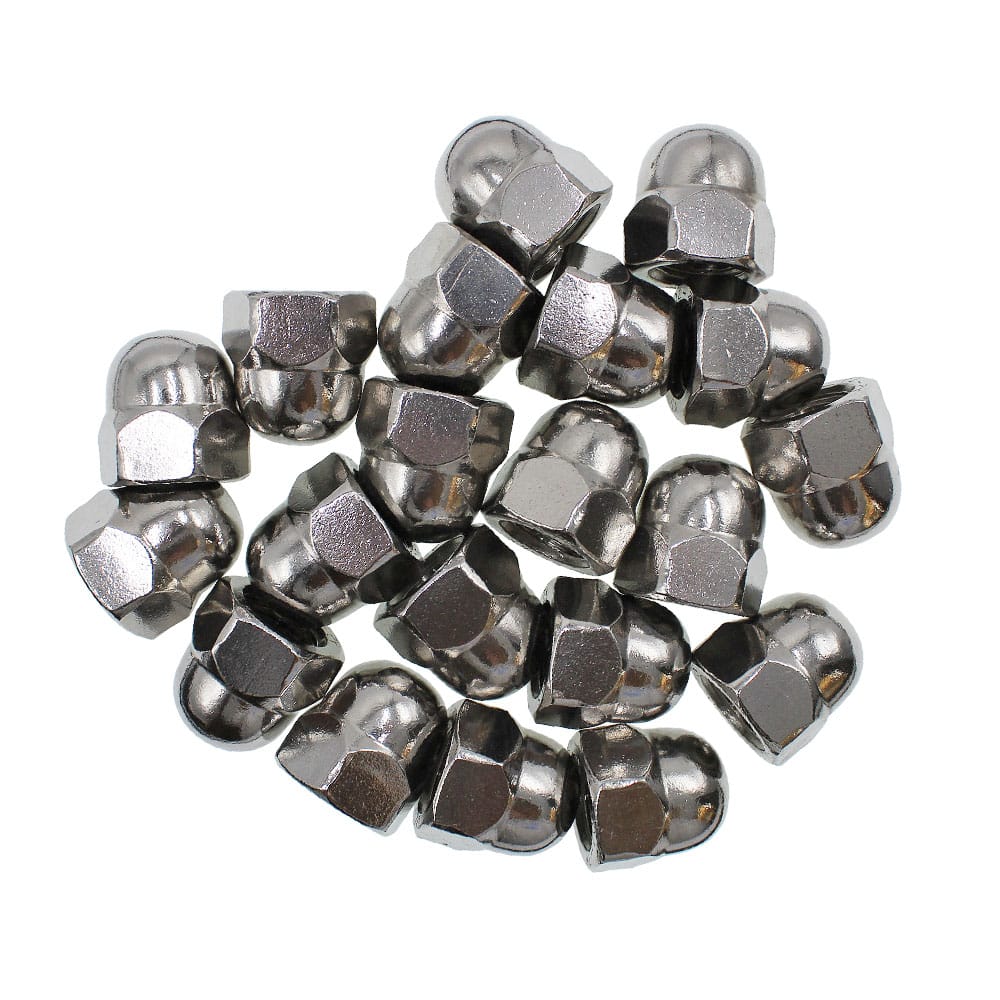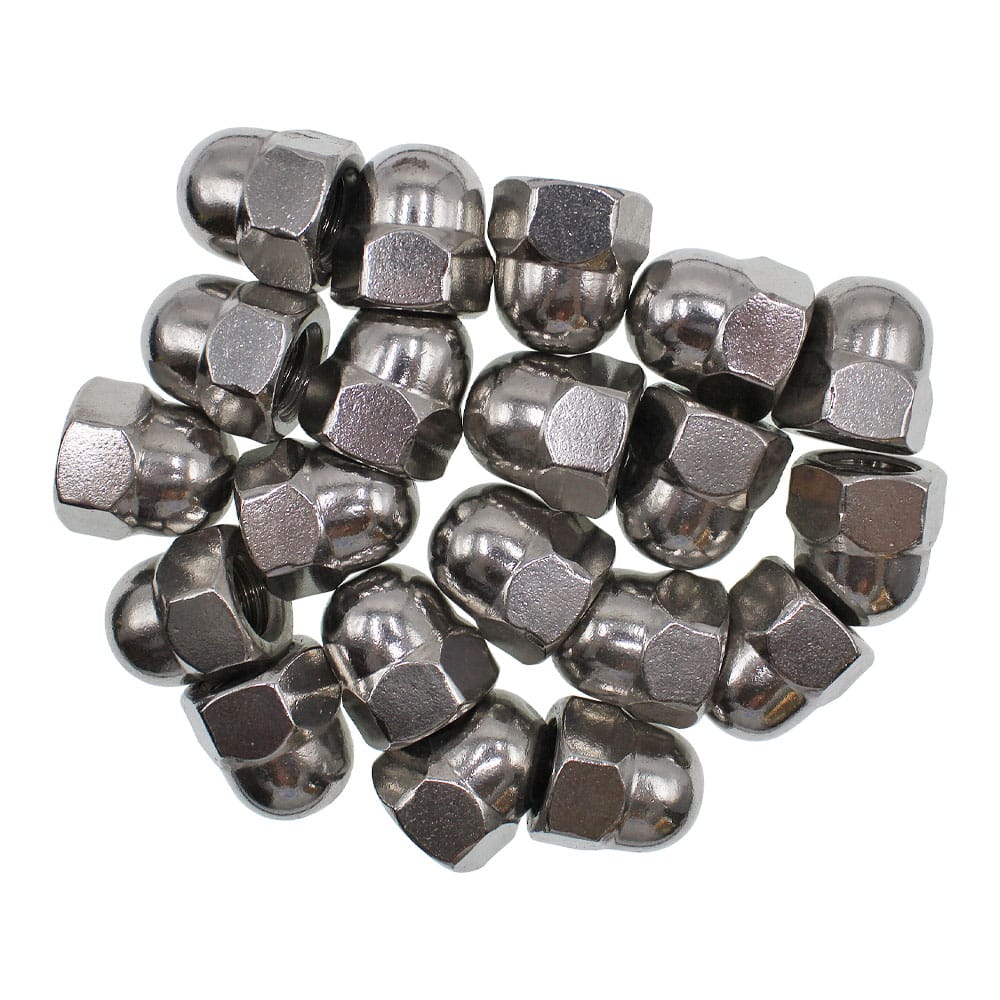- Massive Range
- FREE UK Delivery
- Rapid Dispatch
- Massive Range
- FREE UK Delivery
- Rapid Dispatch
- Massive Range
- FREE UK Delivery
- Rapid Dispatch
£6.34 – £156.41 inc VAT


This website is secured:
£ MULTIBUY SAVINGS – Order 3 For 10% Off
✔ Specialists In Rapid Shipments Of Any Size
✔ FREE UK Delivery Included
✔ Immediate Express Dispatch From Stock
✔ Tracked Delivery with Order Updates
✔ 30-Day Returns Accepted
@ ☏ Larger Pack Quantities Available
Are you looking for a reliable and long-lasting solution for your construction project? Look no further than Speciality Metals’ M20 (20mm) A2 Stainless Steel Dome Nuts! These nuts are the perfect combination of durability, versatility and low maintenance, making them an excellent choice for any project. Plus, with their corrosion-resistant properties, you can be sure that they will stand up to even the harshest environments. And don’t forget – these dome nuts are designed to provide secure fastening and are made with 304 grade stainless steel for added peace of mind. Choose Speciality Metals for your next project and experience the quality and reliability you deserve!

This top quality stainless steel dome nuts are supplied straight from Warrington, UK.
Stainless steel dome nuts are a popular choice among professionals and DIY enthusiasts alike when it comes to finding reliable fasteners. These M20 (20mm) A2 Stainless Steel Dome Nuts from Speciality Metals are not only durable and versatile, but also low maintenance due to their 304 grade material. They are also corrosion-resistant, which makes any project more secure. Whether you’re assembling furniture, fixing a car or working on a large-scale construction project, stainless steel dome nuts provide a secure hold that will last for years.
Standard nuts are not as aesthetically pleasing as stainless steel dome nuts.
Key product details:
Speciality Metals are the best suppliers for you because:
Speciality Metals is a trusted UK based distributor of fasteners, sheet metal, flat bar and round tube. We specialise in rapid delivery to any location around the country. Our team of experienced, friendly staff are at hand at all times to process your order.
Dome nuts made from Stainless Steel 304 can be used in saltwater environments, but there are some considerations to keep in mind. Stainless Steel 304 offers good corrosion resistance; however, it is not as resistant to saltwater as higher grades like 316 stainless steel. The chloride ions in saltwater can lead to pitting and crevice corrosion over time. The rate of corrosion can also be influenced by other factors such as temperature, oxygen levels and water flow.
For less critical applications or those with regular maintenance and replacement schedules, 304-grade dome nuts may be sufficient. However, for long-term or critical applications, especially those submerged in saltwater or exposed to high levels of moisture, using a higher grade of stainless steel like 316 is often recommended. These higher-grade materials are formulated specifically to withstand the corrosive effects of saltwater and are more durable in such environments.
If you do opt for Stainless Steel 304 dome nuts in a saltwater environment, regular inspection and maintenance are advisable to monitor for signs of corrosion and to replace the nuts as necessary. You may also consider applying anti-corrosion coatings or treatments to prolong their lifespan. Always consult with experts or manufacturers for specific advice tailored to your application.
Preparation: Make sure the threaded bolt or stud is clean and free of dirt, rust or burrs. The same applies to the internal threads of the dome nut.
Thread Inspection: Check the threads on both the bolt and the dome nut to ensure they match in terms of size, pitch and form. Using mismatched threads can lead to a poor fit and could damage the threads.
Hand Tightening: Initially, place the dome nut onto the threaded bolt or stud by hand. Turn it clockwise until it can no longer be tightened by hand. Make sure the dome part is facing outward, away from the surface being fastened.
Tool Tightening: Use an appropriate wrench or socket that fits the flats of the dome nut. Tighten the nut by turning it clockwise while holding the bolt in place with another wrench if necessary.
Torque Specification: If there are specific torque requirements for your application, use a torque wrench to achieve the recommended torque. Over-tightening can lead to thread damage or can cause the fastened components to warp.
Alignment Check: After tightening, make sure the components being fastened are correctly aligned and that the dome nut is secure.
Final Inspection: Conduct a final inspection to ensure that the dome nut is installed correctly and meets all the application requirements.
Optional: Use of Adhesives or Locking Elements: If your application requires additional resistance to vibration or loosening, you can apply thread-locking adhesive to the bolt threads before installing the dome nut. Make sure the adhesive is compatible with the materials and the operating conditions.
Safety Check: After completing the installation, perform a safety check to ensure everything is secure and properly tightened.
Dome nuts can be used in high-vibration environments, but additional measures are often required to ensure that they maintain their grip and do not loosen over time. Stainless Steel 304, a common material for dome nuts, does have good mechanical properties, but the nut itself may not provide sufficient resistance to vibration-induced loosening without some form of additional locking mechanism.
Here are some common methods to enhance the performance of dome nuts in high-vibration settings:
Thread Locking Compounds: Anaerobic adhesives can be applied to the threads before tightening the nut to create a bond that resists loosening. These compounds cure in the absence of air and presence of metal, locking the threads in place.
Lock Washers: These are often used in conjunction with nuts to provide extra grip and resist loosening due to vibration.
Double-Nutting: This involves using two nuts tightened against each other on a single bolt. The inner nut is tightened first, followed by the dome nut, which is tightened against the first nut, creating additional friction that helps prevent loosening.
Nylon Insert: Some dome nuts come with a nylon insert that acts as a locking mechanism. These are often referred to as “nyloc dome nuts.”
Serrated or Flanged Nuts: These have a serrated or flanged surface that bites into the material being fastened, providing additional resistance to loosening.
Torque Specification: Proper torqueing according to manufacturer guidelines can also help resist loosening, although this alone may not be sufficient in high-vibration applications.
Regular Inspection: In high-vibration settings, regular inspection and maintenance are crucial to ensure that fasteners remain secure.
The suitability of dome nuts for high-pressure applications largely depends on the material from which they are made, their design and the specific conditions of the application. Stainless Steel 304 dome nuts are known for their good tensile strength and corrosion resistance, but they may not be suitable for extremely high-pressure environments unless specifically designed for such conditions.
Material Grade: Higher-grade materials like Stainless Steel 316 might be more appropriate for high-pressure applications due to better tensile strength and corrosion resistance.
Thread Design: The design and condition of the threads are crucial. Damaged or poorly machined threads can fail under high pressure.
Gaskets and Seals: In high-pressure applications, dome nuts are often used in conjunction with gaskets or seals to maintain pressure integrity.
Torque Specification: Proper torqueing according to the manufacturer’s guidelines is crucial. Over-tightening can lead to thread damage and reduced pressure-handling capabilities, while under-tightening may result in leaks.
Engineering Consultation: For critical high-pressure applications, consult an engineer to conduct a thorough analysis, including finite element analysis (FEA) if needed, to determine the suitability of the dome nuts for the specific conditions.
Quality Assurance: Always procure dome nuts from reputable suppliers and make sure they meet the necessary quality and safety standards for high-pressure applications.
Regular Inspection and Maintenance: Given the high-stakes nature of high-pressure environments, regular inspection and maintenance are essential to ensure the integrity of the fastening system.
Certification and Testing: In some industries, like petrochemical or aerospace, fasteners may need to meet specific certifications or undergo rigorous testing to be used in high-pressure applications.
User Guidelines: Always refer to the manufacturer’s guidelines or consult with professionals to ensure that the dome nuts you are using are appropriate for high-pressure applications.
Dome nuts can be hand-tightened for initial placement or for temporary holding during assembly, but for most applications, additional tightening with a wrench or other appropriate tool is necessary to ensure they are securely fastened. Hand-tightening alone usually does not provide the necessary torque to maintain a secure, long-lasting connection, especially in applications that are subject to vibration, load or changes in temperature.
For critical applications, the dome nuts should be tightened according to the manufacturer’s torque specifications, which usually require the use of a torque wrench for accurate tightening. Even in less critical applications, it’s generally advisable to use a wrench for final tightening to ensure the nuts are secure.
If the application is not mechanically demanding and doesn’t involve any safety-critical aspects, hand-tightening may be sufficient for very short-term or light-duty applications. However, this is generally not recommended for any application where the integrity of the fastening is crucial.
Check out our blogs discussing A2 stainless steel dome nuts. It will prove a useful read to help you to make an informed decision on which material would work best for you.
We are also very proud of our ever expanding YouTube channel.
Our goal for our blogs, videos and help guides is to answer as many questions as possible to help to explain the possibilities of mesh to our customers. Contact us today if you have any questions at all. We are always really keen to help in any way that we can.
We are also very proud of our highly popular eBay store, check us out there too.
Thank you for checking out our product.


Speciality Metals
Unit 1, Farrell Street, Warrington,
Cheshire, WA1 2WW, United Kingdom
Quick Links
Payment Options
